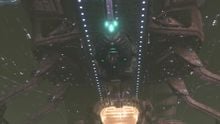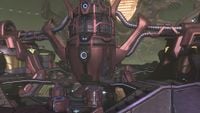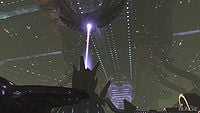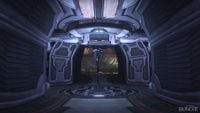Assembly Forges: Difference between revisions
From Halopedia, the Halo wiki
BaconShelf (talk | contribs) m (→Post-war) |
(→Limitations: Reflowing the text) |
||
| Line 19: | Line 19: | ||
===Limitations=== | ===Limitations=== | ||
[[File:H4 SO S01E10 Palmer watching Covenant fleet.jpg|thumb|250px|The ''Zanar''-pattern light cruisers were the result of an errant-but stable-mutation of an assembly forge attempting to build a much larger battlecruiser. As such, they retain the same proportions despite being considerably smaller.]] | [[File:H4 SO S01E10 Palmer watching Covenant fleet.jpg|thumb|250px|The ''Zanar''-pattern light cruisers were the result of an errant-but stable-mutation of an assembly forge attempting to build a much larger battlecruiser. As such, they retain the same proportions despite being considerably smaller.]] | ||
Assembly forges can - at times - be an unstable and unpredictable manufacturing method. Due to being an imperfect replication of Forerunner assembler vat technology, they are susceptible to mutations in design patterns, unaccounted variance in feedstock material, and transcription errors. | Assembly forges can - at times - be an unstable and unpredictable manufacturing method. Due to being an imperfect replication of Forerunner assembler vat technology, they are susceptible to mutations in design patterns, unaccounted variance in feedstock material, and transcription errors. Despite this, not all mutations are unusable. One such example is the genesis of the {{Pattern|Zanar|light cruiser}} - a particularly stable mutation that appeared when the pattern of a [[Covenant battlecruiser]] was inadvertently scaled down from its original size by several times. Despite the mutation, the ''Zanar'' itself was considered suitable enough to begin service in the Covenant as a light warship.{{Ref/Reuse|wf72}} | ||
Correcting the mutation of a design pattern often requires the resetting of the forge that had attempted to produce the design.{{Ref/Reuse|wf72}} | |||
==Assembly forge operators== | ==Assembly forge operators== | ||
Latest revision as of 13:31, December 4, 2024
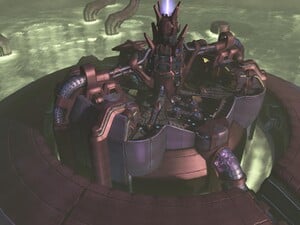
Assembly Forges are the collective various central manufacturing facilities of the Covenant.[1][2] They are a technologically advanced manufacturing method originally pioneered by the ancient interstellar Sangheili prior to the War of Beginnings,[3] based on imperfect attempts to reverse-engineer the assembler vats of the Forerunners.[4] During the three millennia-long reign of the Covenant empire, the assembly forges (particularly the largest and most expansive ones) were housed predominantly on the empire's capital city-station High Charity and were one of the primary instruments used to cement its power until the Great Schism in 2552. With the loss of High Charity to the Flood, assembly forges have become a valuable and contested strategic resource for the Covenant's various splinter groups.
Overview[edit]
Assembly forges operate by way of nanotechnology. Utilising clouds of programmable nanomachines, the forges are fed raw feedstock and given instruction templates known as design patterns, which then assemble items piece-by-piece from scratch.[5] The construction of items in a forge can be likened to "growing" it; with subassemblies being grown from nanocomposite materials and larger independently-constructed components integrated wholesale.[6][7] This leads to Covenant technology being coated in an exterior shell of nanolaminate - with curvilinear, organic contours and an iridescent sheen. These advanced manufacturing methods allowed the Covenant empire to forgo rigid standardization and mass production in favour of custom-built and modified designs[8] - limitations were often opposed by the San'Shyuum bureaucracy for dogmatic and political reasons. Older and outdated materiel may be reduced back to raw feedstock and recycled for reuse in the forges in the creation of new items, with older warships such as the Maugen-pattern armored cruiser broken down to be refashioned into more modern equipment.[9]
The creation and maintenance of design patterns is the responsibility of artisan-engineers - usually a Sangheili or San'Shyuum. Their work is the result of millennia of study and reverse-engineering of Forerunner artefacts by artificers of the Covenant clergy.[6]
Due to the ubiquity of the forges, they are used to manufacture almost all matériel in Covenant life—ranging from small-scale weapons, vehicles, and shuttles up to gargantuan starships. In the case of energy swords, most are manufactured in assembly forges though custom designs may be individually commissioned for construction by dedicated Sangheili blademasters.[10]
Classifications[edit]
There are three known types of assembly forge facilities, graded based on their size:
- Primary Assembly Forges were a series of expansive manufacturing forges and refineries, notably the Assembly Forges located in the Covenant holy city of High Charity.[11] Considered to be the greatest and most capable assembly forges within the empire,[4] High Charity's vast forge labored to meet the demands of the capital and supply the armies of the Covenant.[12]
- Secondary Assembly Forges manufactured light warships and attack ships, such as the Zanar-pattern light cruiser.[13]
- Tertiary Assembly Forges are primarily used for the manufacturing of space fighters, dropships, small arms, vehicles, and other equipment. Some of these forges are built aboard procurator vessels such as the Mjern-pattern agricultural support ship, producing weapons, maintenance kits, food packs, and clothing for the fleet the support ship is attached to.[14][15] Large Covenant carriers may also equip small assembly forges, presumably of the tertiary variety.[16]
Limitations[edit]
Assembly forges can - at times - be an unstable and unpredictable manufacturing method. Due to being an imperfect replication of Forerunner assembler vat technology, they are susceptible to mutations in design patterns, unaccounted variance in feedstock material, and transcription errors. Despite this, not all mutations are unusable. One such example is the genesis of the Zanar-pattern light cruiser - a particularly stable mutation that appeared when the pattern of a Covenant battlecruiser was inadvertently scaled down from its original size by several times. Despite the mutation, the Zanar itself was considered suitable enough to begin service in the Covenant as a light warship.[13]
Correcting the mutation of a design pattern often requires the resetting of the forge that had attempted to produce the design.[13]
Assembly forge operators[edit]
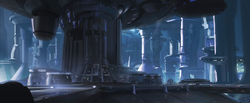
Several organisations operate Assembly Forge, manufacturing arms and equipment for numerous militant groups. These include:[Note 1]
- The clan workshops of the Jiralhanae (in particular the Banished)
- Kolaar Manufactorum
- Lodam Armory
- Merchants of Qikost
- Sacred Promissory (defunct)
History[edit]
The Former Age[edit]
Assembly forges are a technology pioneered by the Sangheili during their era of interstellar civilisation prior to the Covenant's founding. In this era, the Sangheili created many classes of warships now collectively termed vestiges due to their antiquity.[3]
Covenant[edit]
During the Covenant era, the imperial capital city-station High Charity was the site of the largest and most powerful Primary Assembly Forges, becoming a significant industrial powerhouse to fuel the Covenant military.[4] Some colony worlds also became home to large and powerful assembly forges, becoming vital strategic links in the empire. These worlds were generally those that lacked civil or municipal value, becoming known as "fortress worlds" due to their military specialisations. Such worlds include Kostroda and Okal'supen - the latter of which said to house enough assembly forges and feedstock to "build an empire".[17][18] Covenant shipyards consisted of assembly forges situated in orbit over a given world.[3]
One of the primary organisations involved in manufacturing equipment for the Covenant was the Sacred Promissory, operating under the Ministry of Preparation.[19] The Sacred Promissory was tasked with the construction of large quantities of Needle-based weaponry for the empire, alongside being the ones ordained by the Prophet of Truth with covertly beginning to assemble a vast amount of ordnance for the Jiralhanae - in anticipation of the upcoming Great Schism. The Jiralhanae did recieve some forges of their own when incorporated into the empire, with several being constructed inside the craters of Doisac's moons.[20]
In one instance, the Merchants of Qikost aggressively lobbied to protect the design templates of the concussion rifle, meaning they could only be manufactured in Qikostian forges.[21] Fuel rod guns were mostly produced in forges on High Charity and Kostroda, though have now been adopted by the Merchants.[22]
Post-war[edit]
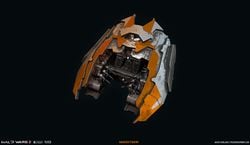
After the fall of High Charity during the Great Schism in November 2552 and the loss of the Primary Assembly Forges, the Swords of Sanghelios and successor factions of the Covenant were forced to turn to independent forges and armories for equipment.[23] The Schism also saw many of the more powerful forges away from High Charity destroyed in the subsequent fighting, such as the orbital shipyards surrounding many Covenant colony worlds.[3] In some cases, this necessity has led kaidons to reactivate of abandoned ancient forges on otherwise-forgotten worlds in the Covenant's periphery, allowing for the reactivation of older vestige warships for service in the Blooding Years.[3] The reliance on independent keep forges has led to a resurgence in improvised and previously-heretical weapons in remnant service, such as the Chwich-pattern Saker and Upisa'weri-pattern Shrike.[24]
The Banished utilise Assembly Forges within the foundries of their forward bases - something which would have been considered heretical during the imperial era of the Covenant, but a necessity for Atriox.[25] However, the Banished more generally rely on simpler designs of Jiralhanae cultural origin (such as the Scrap Cannon),[26] which allow them to maintain an arms industry without relying on access to remains of the Covenant empire - a key advantage over their Sangheili cousins.
More recently, the Anvil Initiative between the Swords of Sanghelios and United Nations Space Command has seen select Office of Naval Intelligence researchers aboard ANVIL Station begin learning the operation of assembly forges from Sangheili teachers.[27] The Sangheili-Human partnership has resulted in the creation of the GEN3 ANUBIS-class Mjolnir helmet; a shell created in assembly forges with electronic and specialist components added into the frame after the forge is complete.[7] Other armour suites produced as a result of this kind of collaboration include the Helioskrill and Thremaleon Mjolnir suits, and the Sangheili Accord harness.
Production notes[edit]
The Halo 3 multiplayer map Assembly occurs within a Deutoros-pattern Scarab-constructing facility in the forges of High Charity.
Gallery[edit]
List of appearances[edit]
- Halo 3 (First appearance)
- Halo Wars 2 (Mentioned only)
- Halo Infinite (Mentioned only)
Notes[edit]
- ^ While never explicitly stated, all of the manufacturers in this section manufacture the materiel utilised by the Covenant and its successor states, having taken over from the Assembly Forges of High Charity. Constructing the Covenant/Sangheili organic forms used in their technology would be impossible without this technology.
Sources[edit]
- ^ Halo Encyclopedia (2022 edition), page 227
- ^ Halo Waypoint, Canon Fodder - Encyclopedia Extravaganza: "‘Assembly forge’ is most often a generic term used to refer to the vast foundries and manufacturing facilities centralized and primarily utilized by the Covenant which produce weapons, vehicles, starships, and other military matériel." (Retrieved on Mar 11, 2023) [archive]
- ^ a b c d e Halo Encyclopedia (2022 edition), page 270
- ^ a b c Halo: Warfleet, page 90
- ^ Halo Waypoint, The New Halo Encyclopedia is Out Today: "ASSEMBLY FORGES - Covenant manufacturing facilities that build items piece-by-piece using clouds of programmable nanomachines." (Retrieved on Mar 11, 2023) [archive]
- ^ a b Halo Encyclopedia (2022 edition), page 216
- ^ a b Halo Infinite, Armor Hall: Anubis Helmet description "The ANUBIS is unusual in that its structural frame and core electronics are "grown" inside Sangheili assembly forges through final assembly and integration uses traditional fabrication techniques."
- ^ Halo Waypoint, Canon Fodder - Have S'moa (Retrieved on Mar 18, 2021) [archive]
- ^ Halo Encyclopedia (2022 edition), page 265
- ^ Halo Encyclopedia (2022 edition), page 307
- ^ Halo: The Essential Visual Guide, page 71
- ^ Halo: Warfleet, page 57
- ^ a b c Halo: Warfleet, page 72-73
- ^ Halo: Warfleet, page 68
- ^ Halo Encyclopedia (2022 edition), page 260
- ^ Halo Encyclopedia (2022 edition), page 262
- ^ Halo Encyclopedia (2022 edition), page 234
- ^ Halo Encyclopedia (2022 edition), page 257
- ^ Halo Waypoint, Canon Fodder - Noble Intentions (Retrieved on May 14, 2021) [archive]
- ^ Halo Encyclopedia (2022 edition), page 281
- ^ Halo Encyclopedia (2022 edition), page 296
- ^ Halo Encyclopedia (2022 edition), page 299
- ^ Halo Waypoint, Phantom (Retrieved on Oct 30, 2021) [archive]
- ^ Halo Encyclopedia (2022 edition), page 304
- ^ Halo Wars 2, Phoenix Logs: Foundry
- ^ Halo Encyclopedia (2022 edition), page 481
- ^ Halo Encyclopedia (2022 edition), page 37
